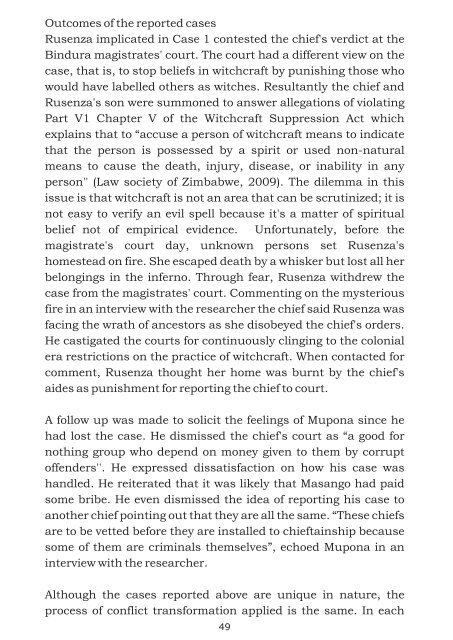Beneficiaries are actors too.pdf - Southern Institute of Peace ...
Beneficiaries are actors too.pdf - Southern Institute of Peace ...
Beneficiaries are actors too.pdf - Southern Institute of Peace ...
Create successful ePaper yourself
Turn your PDF publications into a flip-book with our unique Google optimized e-Paper software.
Outcomes <strong>of</strong> the reported cases<br />
Rusenza implicated in Case 1 contested the chief's verdict at the<br />
Bindura magistrates' court. The court had a different view on the<br />
case, that is, to stop beliefs in witchcraft by punishing those who<br />
would have labelled others as witches. Resultantly the chief and<br />
Rusenza's son were summoned to answer allegations <strong>of</strong> violating<br />
Part V1 Chapter V <strong>of</strong> the Witchcraft Suppression Act which<br />
explains that to “accuse a person <strong>of</strong> witchcraft means to indicate<br />
that the person is possessed by a spirit or used non-natural<br />
means to cause the death, injury, disease, or inability in any<br />
person'' (Law society <strong>of</strong> Zimbabwe, 2009). The dilemma in this<br />
issue is that witchcraft is not an <strong>are</strong>a that can be scrutinized; it is<br />
not easy to verify an evil spell because it's a matter <strong>of</strong> spiritual<br />
belief not <strong>of</strong> empirical evidence. Unfortunately, before the<br />
magistrate's court day, unknown persons set Rusenza's<br />
homestead on fire. She escaped death by a whisker but lost all her<br />
belongings in the inferno. Through fear, Rusenza withdrew the<br />
case from the magistrates' court. Commenting on the mysterious<br />
fire in an interview with the researcher the chief said Rusenza was<br />
facing the wrath <strong>of</strong> ancestors as she disobeyed the chief's orders.<br />
He castigated the courts for continuously clinging to the colonial<br />
era restrictions on the practice <strong>of</strong> witchcraft. When contacted for<br />
comment, Rusenza thought her home was burnt by the chief's<br />
aides as punishment for reporting the chief to court.<br />
A follow up was made to solicit the feelings <strong>of</strong> Mupona since he<br />
had lost the case. He dismissed the chief's court as “a good for<br />
nothing group who depend on money given to them by corrupt<br />
<strong>of</strong>fenders''. He expressed dissatisfaction on how his case was<br />
handled. He reiterated that it was likely that Masango had paid<br />
some bribe. He even dismissed the idea <strong>of</strong> reporting his case to<br />
another chief pointing out that they <strong>are</strong> all the same. “These chiefs<br />
<strong>are</strong> to be vetted before they <strong>are</strong> installed to chieftainship because<br />
some <strong>of</strong> them <strong>are</strong> criminals themselves”, echoed Mupona in an<br />
interview with the researcher.<br />
Although the cases reported above <strong>are</strong> unique in nature, the<br />
process <strong>of</strong> conflict transformation applied is the same. In each<br />
49


